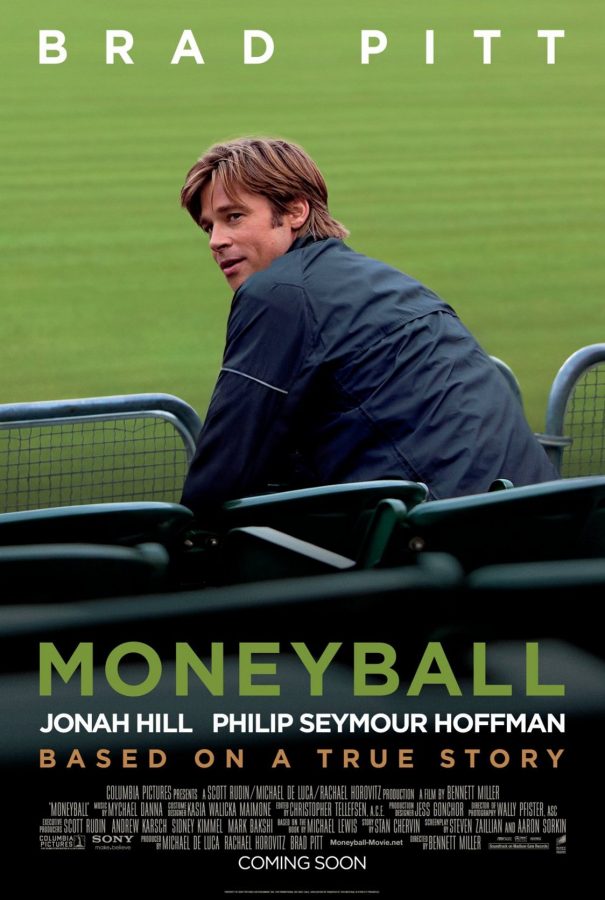“Moneyball” highlights business of baseball
“Moneyball” focuses more on the business of baseball than the players themselves and earns four out of five stars.
September 27, 2011
If you ever collected baseball cards as a kid, then you know what it was like to trade
them. The diplomacy and strategy behind the trading was always based on the bias or
love of the players in question. For instance, I will never trade my Topps 1992 Ken
Griffey Jr. for anything, end of story. But in the new movie “Moneyball” we learn that, metaphorically speaking, the foundation of the best trade or pick is not necessarily the player on the card but rather the stats on the back of it. Now take that mentality and try building a real-life major league team with it.
“Moneyball” follows story of Oakland Athletics
Back in 2002, the general manager of the Oakland Athletics sought to completely alter
the Major League Baseball scouting process in order to accommodate his ball clubʼs minuscule budget.
That man was the captivating Billy Beane, a real-life character of such subtle confidence
and swag that only an actor like Brad Pitt could embody.
“Moneyball” starts off with an American League Division Series loss by the Oakland A’s to the Yankees in 2001. Beane sits in an empty Oakland Coliseum as the game is taking place in New York, holding a portable radio and occasionally turning it on and off to hear his team losing.
Here we get a preliminary taste of how much this man hates to lose. As a failed major league prospect, Beane seems to have taken his competitive drive and geared it toward the business side of baseball. There is a running theme in the movie of him throwing chairs and upturning tables when told bad news or generally frustrated. What a man.
Emphasis on statistics, business of baseball
Above all other things, even baseball itself, “Moneyball” is a film about business in sports. This is where Peter Brand comes in. As a fictional character representing a handful of real people who contributed to the actual Moneyball system in 2002, Brand is a Yale grad and all-around lovable nerd, played by the equally lovable Jonah Hill. It was refreshing to see Hill finally playing a role I could respect, unlike his funny but all-around obnoxious characters in “Superbad” and “Forgetting Sarah Marshall.” He is a very talented actor who seems to be increasingly owning his star potential.
So, down on his teamʼs luck financially and eager to reinvent the preseason process of
replacing expired MVPs, Beane turns to Brand who reveals the flaws in the way scouts
tend to scout. He claims that ball clubs only look at players when they should be looking
at stats, like on-base percentages. They need to “buy runs, not players,” according to
Brand. Beane likes the sound of this and hires him as assistant general manager. So begins the mayhem.
To the dismay of the Oakland scouters who do things the old fashioned way, Brand
explains to Beane that there are legions of players with untapped potential who are
dismissed by ball clubs simply because they are taken at face value. Thereʼs a pitcher
who throws so low he makes the “submarine” technique look like an over-hand toss, a
former catcher with some torn ligaments who’s afraid to play first base and a hitter
pushing 40 with barely enough stamina to last pre-game warm ups. But no matter, they all
have one thing in common that appeals to Beane: They get on base, assure runs
and put points on the scoreboard.
After a brief string of losses with the new and peculiar roster, the Aʼs suddenly find new
life and things shift gears, launching Oakland toward a tentative chance at making baseball history. “Moneyball” does well to keep the audience engaged amidst the constant baseball terminology and talk of stats through Pitt’s appeal and delivery. The way he plays Beane is clever, assertive and downright charming. Even Brandʼs dialogue of mathematics is easier to swallow when carried by Hill’s understated performance. On top of all this, the chemistry between Pitt and Hill is stupendous.
Director Bennett Miller, who took on the very dark project “Capote” back in 2005, delivers crisp visuals and, though they are brief, some of the best on-field sequences Iʼve seen in any baseball movie. There is also great use of archive footage. The script by Steve Zaillian and Aaron Sorkin is sharp, smart and exhibits the same great humor that made Sorkinʼs screenplay for “The Social Network” so accessible and appealing to modern audiences.
Film loses focus on players central to plot
One quarrel I have with “Moneyball” is the lack of focus on the players themselves. The movie is an obvious vehicle for Pitt with strong supporting performances from Hill and Philip Seymour Hoffman as Oakland’s conservative coach Art Howe. However, more involvement by the players who were so central to the overall plot would have been welcome.
Sports movies these days seem to be raising the bar. Last yearʼs “The Fighter” and “The Blind Side” the year before are both testaments to that. Features like these depict the human stories behind the sport and how the emotional pulls and circumstances of people can affect everything about the game and how itʼs played.
“Moneyball” is a great movie that gives us a relevant and concise look at what happens behind the scenes of Major League Baseball and how things drastically changed back in 2002 thanks to the perseverance of Beane and the Oakland Aʼs.







